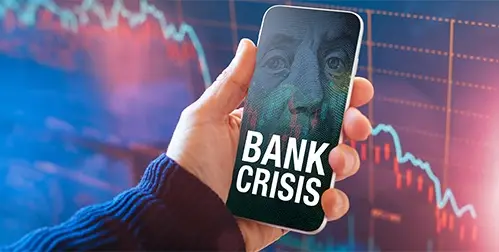- Financial gurus are going long on gold, expecting its upward trajectory to continue
- Central bank buying, recession, record debt, and renewed Western investment all fuel the rise in gold prices
- Now may be the opportune time to add physical precious metals to your portfolio in a Gold IRA before prices rise again
Gold Predicted to Rise Even Further
As global financial markets face heightened volatility and uncertainty, many investors are turning to gold as a safe haven asset. Prominent figures like Robert Kiyosaki and experienced traders from “The Big Short” fame have made bold predictions about the future of gold, citing various economic factors that could drive its value significantly higher.
Kiyosaki Warns of a Crash
“Rich Dad Poor Dad” author Robert Kiyosaki has warned of both a massive market crash and a subsequent money-making opportunity. He recently stated, “Technical charts indicate the biggest crash in history coming. Prices of real estate, stocks, bonds, gold, silver, & bitcoin crash.” Kiyosaki suggests that a market crash could be devastating, considering the extensive exposure of investors. For comparison, Americans lost about $16 trillion in net worth during the financial crisis of the late 2000s.1
Kiyosaki believes that after the crash, there will be an excellent time to buy assets at bargain prices. He forecasts a significant bull market cycle benefiting gold, silver, and bitcoin, driven by a lack of confidence in US currency. The country’s debt could destroy faith in the currency, drastically devaluing it.
Kiyosaki made bold price predictions for after the crash: “Gold possibly $15,000 an ounce, silver possibly $110.00 an ounce, and bitcoin easily to $10 million per coin,” he wrote. Given that gold currently trades at $2,424 per ounce, silver at $29 an ounce, and bitcoin around $66,200 per coin, this forecast implies a 519% upside in gold, a 279% upside in silver, and a staggering 15,000% upside in bitcoin.2

“Big Short” Traders Back Gold
Other traders, such as “The Big Short” investors Danny Moses, Vincent Daniel, and Porter Collins, are also going long on gold. Known for their successful bet against the housing market ahead of the 2008 crisis, these traders have expressed concern that Americans do not hold enough gold in their portfolios. Collins pointed to massive central bank buying and the US budget deficit as reasons to buy gold, leaning heavily on the dollar debasement thesis. This thesis argues that the value of the US dollar declines over time due to excessive money printing and inflation, eroding purchasing power.
“If you just think about that one dollar in your wallet, tomorrow it’s worth less,” Collins added. “I think that in … one, two, three, five, 10 years, you’re going to make a lot more money in gold than you will in U.S. Treasurys, and I think that’s just not changing.”3
Gold’s Performance
Gold has been a better investment than stocks, bonds, or real estate this year, according to Morningstar. Since January 1, gold has provided a 14% return compared to 12% for the S&P 500 index of large U.S. stocks and 2% for the S&P 600 index of small U.S. stocks. Meanwhile, the iShares Core U.S. Aggregate Bond index fund is down 1%, and real estate investment trusts (REITs) have lost nearly 5%.4
.
 5
5
However, the real, inflation-adjusted price of gold is almost twice the average since it began floating freely in 1975. It is close to the peak seen during 2011. Since the dollar has also been rising, gold is even higher in other currencies. In both Japanese yen and British pounds, today’s gold price is about 45% higher than the peaks seen back then, even when adjusted for inflation. 6
Interestingly, U.S. investors have mostly missed this latest gold boom. Despite gold proving a better investment than 10-year U.S. Treasury bonds for over 30 years. Treasuries are actually losing their status as the unquestioned “go-to” safe asset. Questions about US creditworthiness and a growing de-dollarization movement are eroding confidence in the government bonds.
U.S. investors have been net sellers of exchange-traded bullion funds so far this year, totaling $4 billion according to the World Gold Council. Analysts attribute this to investors not wanting to miss out on a booming stock market.7
Gold Drivers
Central banks continue to be the leading buyers of gold. When Western investors catch up, analysts foresee another significant leap in gold prices. Despite breaking all-time highs, gold is considered underpriced for several reasons. The economic landscape has shifted significantly in favor of gold, with the value of gold compared to the dollar increasing more than the markets expected since 1980 or 2011. The impact of returning Western interest could be substantial. From 2005-2011, flows into GLD (the largest gold-backed ETF) added approximately 38.1 million ounces, driving the metal price from $535 to over $1,800, more than a 300% increase.8
A recession, which many indicators suggest is inevitable, would cause demand for gold to surge. Evidence of a weaker economy seems to be ignored by investors looking to ride the stock market as high as the bubble will go. Some economists argue that massive government spending is the only thing propping up the economy, the same spending that jeopardizes the country’s creditworthiness and raises the risk of more inflation.
According to certain analysts, gold is in the middle of a multi-year advance. Geopolitical conflict, stock overvaluation, and volatile U.S. elections all contribute to safe haven demand for gold.
Conclusion
The consensus among numerous sources is clear: gold’s upward trajectory is likely to continue for years to come. Continued central bank buying, fears of dollar devaluation, and a hedge against stock volatility and recession are just some of the factors driving this trend. Another surge in gold prices is expected when Western investors, currently caught in the stock market bubble, match the enthusiasm of their non-Western counterparts. Now may be the opportune time to add physical precious metals to your portfolio in a Gold IRA before prices rise again. Contact American Hartford Gold at 800-462-0071 to learn more.





 3
3






 8
8

 4
4

